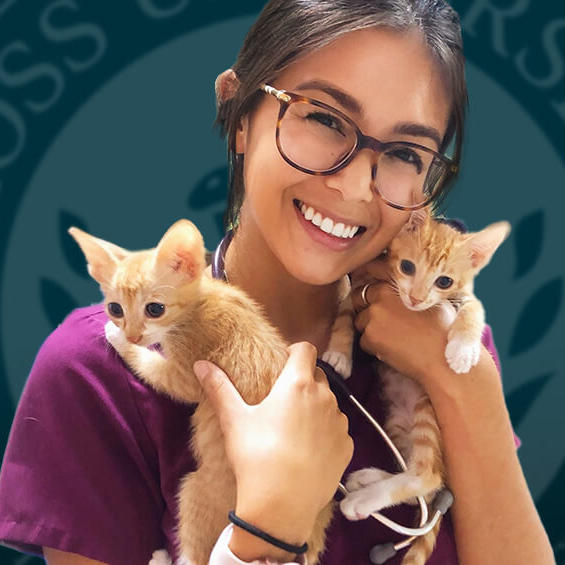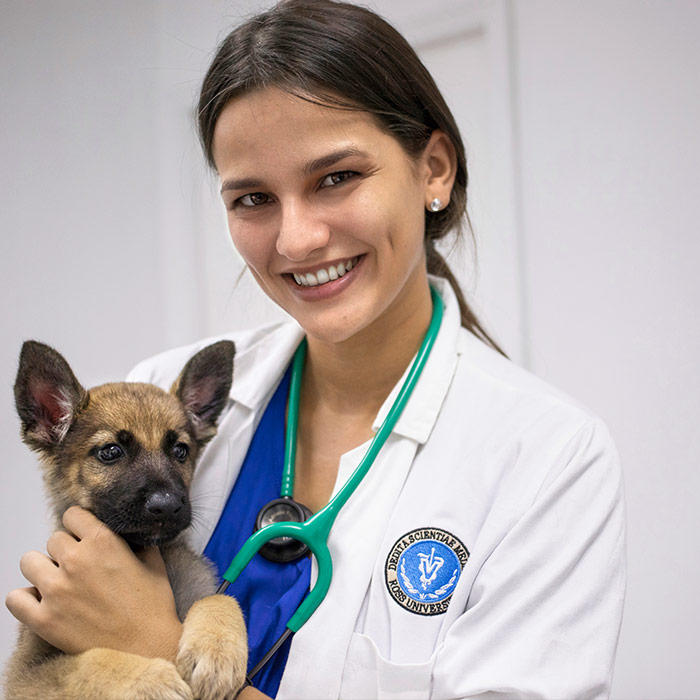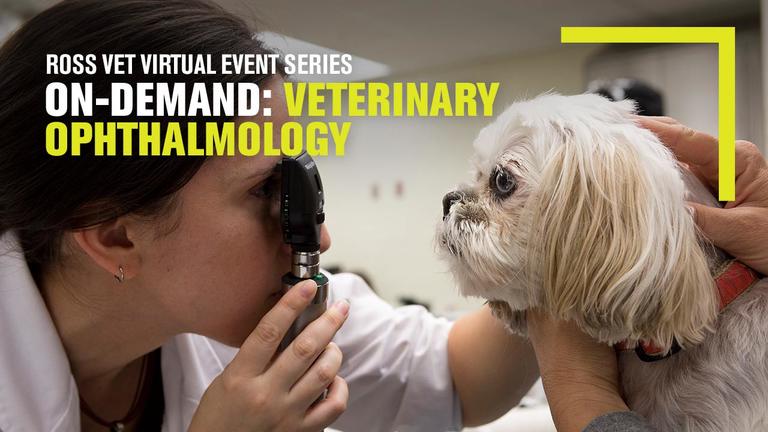What’s it like to treat an animal with cataracts? Find out by joining our Virtual Ophthalmology Workshop, hosted by alumna Dr. Candace Auten!
Dr. Auten specializes in veterinary ophthalmology, helping treat vision and eye problems for a variety of species; some of her more common cases include tear film abnormalities, corneal disease, and surgical cataract removal. Watch this on-demand workshop for the opportunity to:
- Familiarize yourself with the basics of performing a routine eye exam on an animal
- Discover how to identify the signs of cataracts
- Learn about the process of surgical cataract removal
- Experience a day in the life of a veterinary ophthalmologist
Growing old gracefully - eye care for animals
Growing old gracefully can be hard. Just like humans, animals experience age-related issues like sore joints and stiffness, vision issues, weight gain or loss, and the onset of age-related diseases. And just like their human companions, routine ophthalmic examinations with a veterinary ophthalmologist can help in identifying age-related changes and other vision challenges. Many age-related changes in vision can be improved with the help of a veterinary ophthalmologist through non-invasive medical treatment, once properly differentiated from more invasive and progressive diseases.
Common changes in pets as they age include nuclear sclerosis, glaucoma, cataracts, and iris atrophy.
Nuclear sclerosis
Nuclear sclerosis is a normal aging change of the lens. Similar to when you age, you may need reading glasses, a dog with nuclear sclerosis will have difficulty seeing up close. Going down the stairs or catching a small ball or treat may be more difficult. So, what exactly causes this? The lens is made up of layers of cells arranged like the layers of an onion. As animals get older, the cells become packed together more tightly as new layers are added. The increased density of the lens causes it to look cloudy in dogs over six or seven years of age. The lens will continue to appear cloudier over time.
Glaucoma
Aging pets are often susceptible to glaucoma. The condition is caused by high pressure in the eyes, leading to symptoms such as red, cloudy, swollen, and sore eyes. Your pet can become permanently blind if the condition is not treated.
Cataracts
Cataracts and nuclear sclerosis may often be confused due to the similarity in presenting features. However, with cataracts, the condition continues to diminish vision and can lead to blindness. In cataracts, the lens turns opaque. It is often associated with diabetes in your pet and should be discussed with your vet ophthalmologist..
Iris Atrophy
The colored part of the eye, the iris, is a muscle that helps filter out light. As your pet ages, the muscles can become weaker or atrophy. Due to these changes, you may notice your pet is more sensitive to light. Because this condition can easily be mistaken for a potentially serious problem like glaucoma, visiting your veterinary ophthalmologist regularly for wellness visits can help with prevention and early identification of more serious issues.
Common eye conditions and eye care tips
Your pet’s eyes are often a good indicator of many health issues. As any veterinary ophthalmologist can tell you age-related symptoms like clouding of the lens can be unsettling despite its commonplace. As your beloved pet ages, there are some basic steps you can take to ensure your pet’s eyes are protected and help them as they age.
Look them in the eye: Regularly examining your pet’s eyes will help catch problems in the early stages. Take a peek at your pet’s eyes in a brightly lit area and look for any changes. If the eyes indicate any level of irritation or sudden change such as pale, cloudy, red inflamed, crusty, or watering, be sure to seek medical attention.
Keep it clean: Clean your pet’s eyes every day. Gently remove dirt and discharge with cloth. Persistent runny eyes may indicate an infection. If your pet has hair around its eyes, regularly trim it to keep their field of vision clear and prevent hairs from poking the eye.
Add lights: Add additional night lights near stairs and unfamiliar places, try not to change the layout of the house, and make sure that the entire family is aware of the pet’s environment (i.e. supervision while outside, near swimming pools, etc.).
The right diet: You can support your pet’s eye health with the right food. A nutrient-rich diet supports overall good health and can help protect your pet’s ocular health. Look for food high in antioxidants.
Sunglasses and sunshades: Ever thought of doggles? They can help your dog enjoy the afternoon hours more comfortably. If your pet is sensitive to the light, be sure to keep them out of direct sunlight, draw the sunshades in your home, and avoid certain times of the day if your pet needs to be outside.
Although getting older is inevitable, there are many things that we can do to help our pets age comfortably. Routine eye examinations with a veterinary ophthalmologist can be an important part of a wellness program for your pet at every age.
Webinars On-Demand
Want to learn more about Vet Ophthalmology? Watch Ross Vet’s Veterinary Ophthalmology Workshop hosted by alumna Dr. Candace Auten ’06.
Tune in live to an event just like this one! See our list of virtual events and livestreams coming soon. Each one is hosted live, so you’ll get the opportunity to have your questions answered by our hosts in real-time. Secure your spot today!
Start your Journey
Pursue your passion for veterinary medicine. Learn more about a Doctor of Veterinary Medicine degree today.

Discover the veterinary profession like you never have before. Join Ross Vet alumni, faculty, and colleagues for on-demand webinars that can kick-start your knowledge of veterinary medicine. Explore our learning environments, veterinary specialties, procedures, and case studies before you even become a vet student!

Earning your DVM from Ross University School of Veterinary Medicine offers you much more than a path to animal practice. It unlocks a much larger world of far-reaching career opportunities in veterinary medicine, from companion and exotic animal care, to research that could affect animal and human health on a global scale. From general practitioners to researchers and more, there's a world of possibilities out there to explore.
About Ross Vet
Ross University School of Veterinary Medicine is accredited by the American Veterinary Medical Association Council on Education (AVMA-COE). Since its founding in 1982, RUSVM has graduated over 7,000 veterinarians, many practicing in every US state, in Canada and Puerto Rico, and abroad.




